And, I am happy with it because all pieces join together pretty well =) Although, I spent quite a bit of time on this tutorial, doesn't matter. What's done is done ...
Showing posts with label Vase. Show all posts
Showing posts with label Vase. Show all posts
Monday, 3 August 2009
090803 Vase Physical Model
Today I finally get my laser cut done and put them together. Gave the vase a flat white spray paint finish for aesthetic purpose.
Saturday, 1 August 2009
090731 Vase Matrix Using Section
We are to create a matrix using the command "SECTION" in rhino. The sections will then translate into cad format for modification on joints. Then, print the cad drawing to pdf for 2d laser-cut.
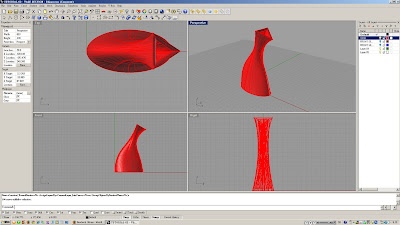
Step 01:
- Open vase model in rhino
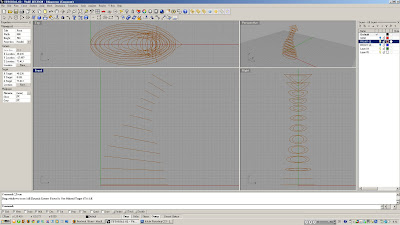
Step 02:
- From front view, create sections with an incremental angle from bottom to top
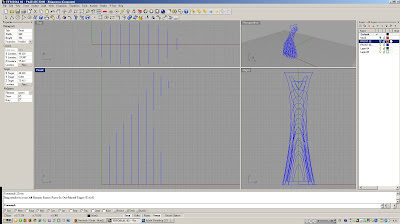
Step 03:
- Create vertical sections every 10mm
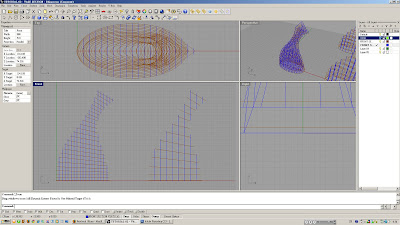
Step 04:
- The vase might not be able to hold itself esp. the neck
- Created more sections with 5mm increment
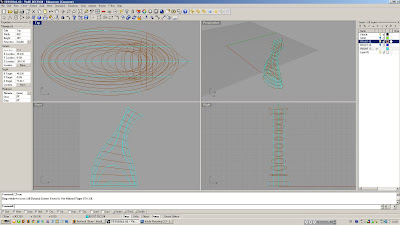
Step 05:
- Try creating vertical sections from right viewport
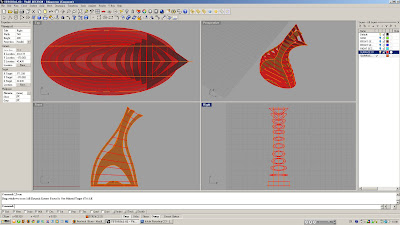
Step 06:
- Create surfaces from planar curve(s)
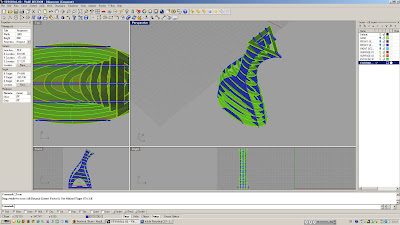
Step 07:
- Extrude surfaces by 0.5mm on both sides cap on
- Consider using 1mm strawboard, hence such extrusion
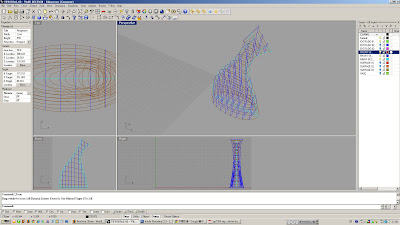
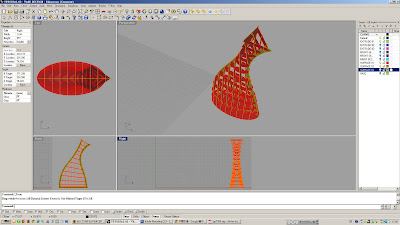
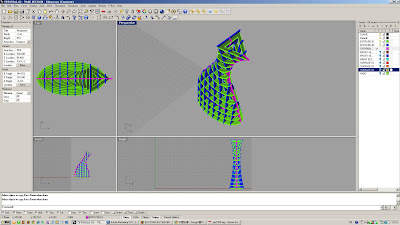
Step 08:
- Variation 01
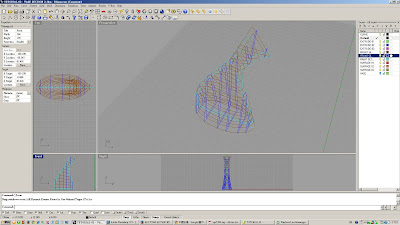
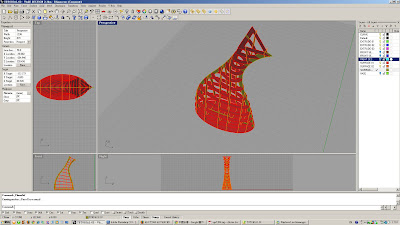
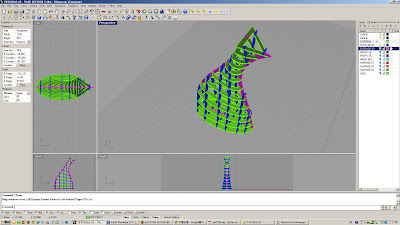
Step 09:
- Variation 02
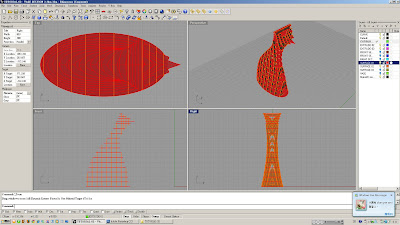
Step 10:
- Ultimately, orthogonal horizontal and vertical sections from front viewport was chosen
- Create more sections closer to the top to increase structural stability
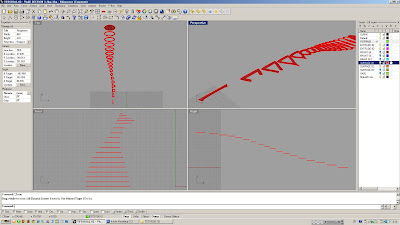
Step 11
- I think using extrusion and boolean difference will mess up the model by having weird cutout, etc. Therefore, I only use surfaces and the command intersection to create intersection curves on surface for flatten
- After intersecting surfaces, hide vertical elements.
- Lay out horizontal sections with curves across the top view
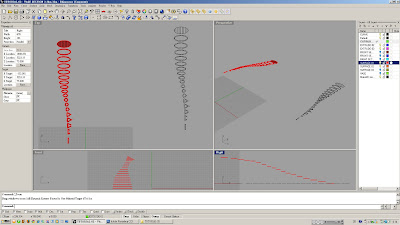
Step 12:
- Use command "Make2D" and select all visible surfaces
- A set of lines will be created on z=0
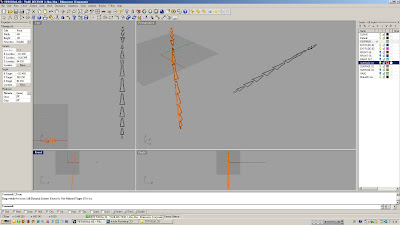
Step 13:
- Do the same for the vertical sections
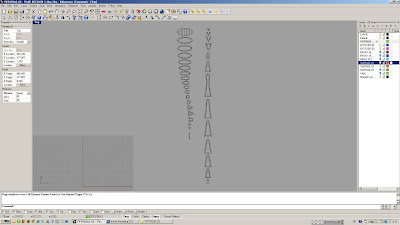
Step 14:
- Remove/hide unwanted elements, leaving only the lines for "export to cad format"
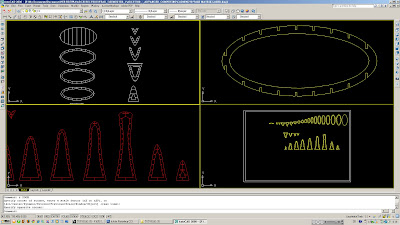
Step 15:
- Create joints (think of how the pieces should be joined together)
- I use clipping system for my vase, i.e. split the vertical sections into half such that they can clip onto the horizontal sections.
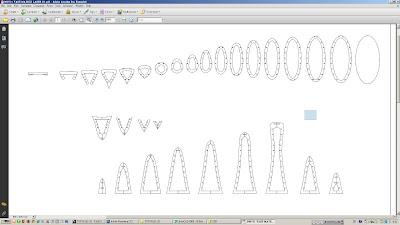
Step 16:
- Create PDF(s) for laser-cut
The appointment for laser is on Monday morning 11am. I hope everything goes well without major accident. More images after completion.

Step 01:
- Open vase model in rhino

Step 02:
- From front view, create sections with an incremental angle from bottom to top

Step 03:
- Create vertical sections every 10mm

Step 04:
- The vase might not be able to hold itself esp. the neck
- Created more sections with 5mm increment

Step 05:
- Try creating vertical sections from right viewport

Step 06:
- Create surfaces from planar curve(s)

Step 07:
- Extrude surfaces by 0.5mm on both sides cap on
- Consider using 1mm strawboard, hence such extrusion



Step 08:
- Variation 01



Step 09:
- Variation 02

Step 10:
- Ultimately, orthogonal horizontal and vertical sections from front viewport was chosen
- Create more sections closer to the top to increase structural stability

Step 11
- I think using extrusion and boolean difference will mess up the model by having weird cutout, etc. Therefore, I only use surfaces and the command intersection to create intersection curves on surface for flatten
- After intersecting surfaces, hide vertical elements.
- Lay out horizontal sections with curves across the top view

Step 12:
- Use command "Make2D" and select all visible surfaces
- A set of lines will be created on z=0

Step 13:
- Do the same for the vertical sections

Step 14:
- Remove/hide unwanted elements, leaving only the lines for "export to cad format"

Step 15:
- Create joints (think of how the pieces should be joined together)
- I use clipping system for my vase, i.e. split the vertical sections into half such that they can clip onto the horizontal sections.

Step 16:
- Create PDF(s) for laser-cut
The appointment for laser is on Monday morning 11am. I hope everything goes well without major accident. More images after completion.
Tuesday, 28 July 2009
090728 Vase Transformer
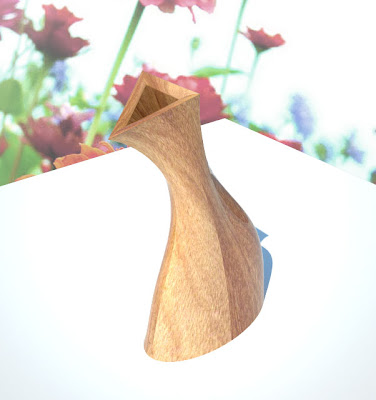
We have to design a vase for our 1st tutorial exercise. This vase is going to be 3d printed or laser cut on Wednesday 090729. I think my vase is going to be 3d printed. Basically, the vase has a simple design which is lofted with basic geometry.

Step 1
- Draw 2 ellipses, 1 circle, 1 triangle within 50mm x 50mm grid extend

Step 2
- Offset each shapes by 1mm

Step 3
- Select all inner shapes and loft them

Step 4
- Select all outer shapes and loft them

Step 5
- BlendSrf the top of the vase with default blend mode

Step 6
- Draw a CutPlane prepare to create the capacity for the vase
- Trim the inner lofted surface
- Create surfaces for the base by using PlanarSrf

Step 7
- Draw a base plane with PlanarSrf

Step 8
- Apply timber material to the vase
- Apply light grey diffuse colour to the base plane
- Render the vase with V-ray with caustics On
Duration: 120 minutes
Subscribe to:
Posts (Atom)






